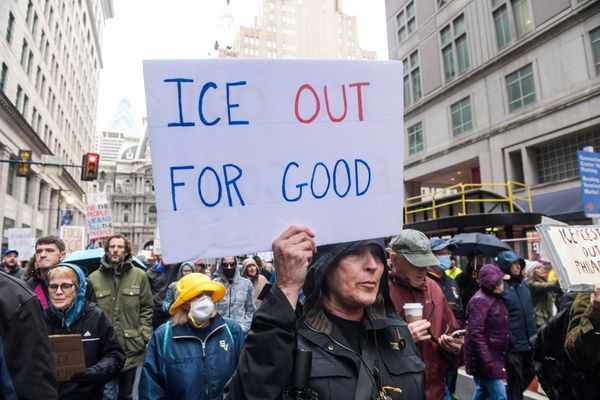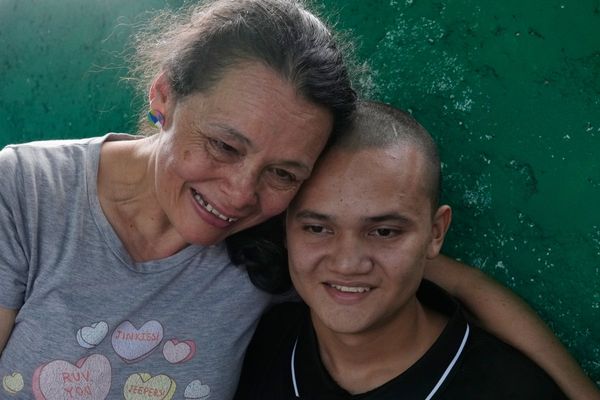
Shabana Mahmood knows what it is like to live in an area where crime feels out of control. While she was growing up in Small Heath in inner-city Birmingham in the 1980s and 90s, her father kept a cricket bat behind the till of the family shop to fend off would-be robbers.
Three decades later, Mahmood is Labour’s justice secretary and lord chancellor, tasked with cutting crime at a time when public concern about it is rising.
Though violent crime has fallen steadily over decades, recent increases in highly visible offences including shoplifting and snatch theft have contributed to a feeling of lawlessness and insecurity.
Fanning the flames are politicians including Nigel Farage, the Reform UK leader, and Robert Jenrick, Mahmood’s Conservative counterpart, who have sought to draw a link between crime – particularly sexual assault – and immigration.
For Mahmood, being the daughter of immigrants is central to her worldview about justice. “She feels very strongly that being British is a responsibility as well as a right,” a source close to her said. “She really does feel like it’s an affront when people who come here are afforded the welcome that she and her family were, but break the laws of the land.”
Another politician shaped by his upbringing as the child of immigrant parents was Rishi Sunak, who felt strongly that it was an injustice for people to arrive illegally in Britain on small boats. Though their backgrounds and politics are very different, Mahmood and Sunak crossed paths at Oxford in the late 90s, with a teenage Sunak pledging his support for Mahmood when she stood for president of the Lincoln college student union.
Last week, she received the surprise endorsement of another high-profile Tory: Michael Gove. Asked by the Politics Inside Out podcast to choose this government’s standout figure, he replied without hesitation: Shabana Mahmood. Mahmood is a politician with “a totally coherent worldview” who “embodies in some respects the Labour coalition”, he said.
Mahmood has a growing number of admirers inside the Labour party, too. Having been a central figure in the Keir Starmer project from its early days, she is highly rated by No 10 and is thought of as one of its most effective ministers. A cabinet colleague said she “never wastes a word” in meetings, and recently warned that the government was still caught up in an opposition mindset and preoccupied with taking on the left instead of speaking to the concerns of the country more widely. She has also been a leading advocate for the UK to take a more pro-Palestinian stance, including on statehood.
Those who have worked with Mahmood praise her political nous. This year, she emerged unscathed from a clash with Jenrick over new sentencing guidelines that would have made an offender’s ethnicity or faith a greater factor when deciding whether to jail them. She forced the Sentencing Council to back down and has ordered a review of its role.
Early on, she also clashed with Richard Hermer, the attorney general, amid claims he was obstructing aspects of the government’s agenda. Colleagues say the pair get on well personally but come from different traditions. “Shabana believes, above all else, in parliamentary sovereignty and the value of our common law system. That makes her more of a reformer on things like the ECHR, [European convention on human rights]” a source close to her said. A former Conservative minister said: “She has much better political antennae than Lord Hermer – she recognises that the law ultimately has to command public confidence.”
One source who has worked with her in a previous role said: “Her instincts are so well honed, it’s quite something. It’s a product of a number of things, she comes from a very political family and a very febrile political environment in Birmingham.” Her father was chair of the Birmingham Labour party and would host meetings for organisers – including Tom Watson, the future deputy Labour leader – in his living room over tea and samosas.
Unusually among politicians, she has spoken about the importance of her faith. “It is the absolute core of my life,” she told Gove in an interview with the Spectator. “It’s where I draw my sense of duty and public service from. My understanding of Islam, how I’ve practised Islam my whole life has been about viewing life as a gift from God but it’s also a test from God.”
“She is a very defined politician with a real instinct for the times,” said Charlie Falconer, who served as justice secretary under Tony Blair. “She is somebody who does understand politics in a profound way, and having been the campaign coordinator for Labour for quite some time she knows what has to be done in order to win elections.”
Mahmood was elected to parliament in 2010 and within six months was promoted to a shadow frontbench role. In Starmer’s shadow cabinet, she spent more than two years as national campaign coordinator, a role in which she became indispensable to the strategy chief, Morgan McSweeney. She is credited for helping secure the narrow but fateful win in the 2021 Batley and Spen byelection, without which Starmer would probably have faced a leadership challenge that summer.
In the justice department, she has arguably inherited the most difficult situation of any minister. In her first week, she announced the early release of thousands of criminals in response to the overcrowding crisis in English and Welsh prisons. “She knows she has got two things she has got to do in the justice department: get it out of this constant cycle of crisis and also use it to actually cut crime,” said the source close to her.
She has set out plans for reforming the criminal justice system, which have ranged from chemical castration for serious sex offenders to allowing criminals to spend less time in prison and instead be rehabilitated in the community. She has taken inspiration from Texas, where there is a blend of hardline and progressive measures. “She’s not bowed down by an ideological approach to these things. She can blend some populism in with what are very strong values,” said the person who worked with her in the past.
Mahmood’s experience of government so far has convinced her of the need to rewire the state and empower elected politicians over officials and quangos. “Shabana is starting to be seen particularly as a leader of ‘if we need to break things, we should break things’ … She has come to really believe in the depths of state failure,” one MP close to her said. In a speech in Strasbourg this summer, she announced that the UK would seek reform of the European convention on human rights amid concerns about it being cited to block the deportation of dangerous offenders.
The justice secretary has a busy autumn in store, starting with plans to introduce a bill in September to deliver her sentencing reforms including shorter prison sentences for some offenders. Before the end of the year, she intends to set out the other half of her reform agenda to tackle the groaning backlog in crown courts, after a review by Brian Leveson recommended that some offences be tried without a jury.
However she performs in government, by the time of the next election Mahmood may face her biggest challenge at home. Her majority in Birmingham Ladywood dropped from nearly 30,000 in 2019 to 3,400 last year after a challenge from a pro-Gaza independent candidate. Zarah Sultana, the independent MP who is starting a party with Jeremy Corbyn, is said to have designs on the seat.
Allies of Mahmood say that her challengers face an uphill struggle. “She is much more deeply embedded in her community than others who lost or came close to losing were,” the source close to her said.
In parliament in recent months, Mahmood has hosted dinners with small groups of Labour MPs interested in the reforms she is planning.
Some on the backbenches have begun to see her as a future leader. “If she ever put the hat in the ring, it would be because she wanted the debate to be rigorous and bold and she wanted to be the person who forced that kind of honesty,” the MP close to her said. “But it tends to be the case that the people who propagate that kind of message don’t win.”







